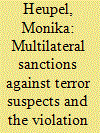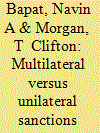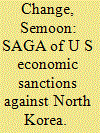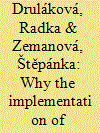| Srl | Item |
| 1 |
ID:
086950


|
|
|
|
|
| Publication |
2009.
|
| Summary/Abstract |
The UN and EU sanctions regimes against suspected terrorists at first clearly violated commonly accepted due process standards. Both organizations gradually reformed the procedures that regulated which individuals and entities were subject to sanctions, yet the UN procedures in particular still evince important shortcomings. While international law scholars have debated how the sanctions regimes must be designed to be consistent with international law, political science scholars have, as yet, largely held back from looking into why the regimes evolved in the way they did. This article suggests that court decisions and proceedings and, in the case of the UN, falling commitment from member states, have prompted the UN Security Council and the Council of the EU to implement limited reforms. However, courts did not challenge the sanctions regimes per se and there was no substantial pressure from civil society actors. Moreover, owing to the competences and working methods of the UN Security Council and the Council of the EU, powerful member states could fairly easily deflect reform proposals from disaffected states and other UN and EU bodies.
|
|
|
|
|
|
|
|
|
|
|
|
|
|
|
|
| 2 |
ID:
092342


|
|
|
|
|
| Publication |
2009.
|
| Summary/Abstract |
Policymakers frequently argue that multilateral sanctions are more likely to induce a target state to alter its behavior than are unilateral sanctions. Repeated empirical studies using the familiar Hufbauer, Schott, and Elliot data set demonstrate that unilateral sanctions "work" more often than multilateral sanctions, however. In this study, we subject three theoretical explanations for this counterintuitive finding to additional empirical testing utilizing the new Threat and Imposition of Economic Sanctions (TIES) data. Somewhat surprisingly, the analyses using these new data support the intuition of policymakers; that is, multilateral sanctions do appear to work more frequently than do unilateral sanctions. Our results do support one theoretical argument, based on spatial models, that we test. This explanation holds that whether multilateral or unilateral sanctions are more effective depends on the number of issues at stake and on whether an international institution is involved. Our analyses provide support for these hypotheses.
|
|
|
|
|
|
|
|
|
|
|
|
|
|
|
|
| 3 |
ID:
075509


|
|
|
| 4 |
ID:
175460


|
|
|
|
|
| Summary/Abstract |
Despite the intensity of research into UN multilateral sanctions, the implementation of sanctions in states with no autonomous sanctions policy has been almost neglected. This sharply contrasts with the fact that their noncompliance may hinder the efficiency and effectiveness of sanctions significantly. To demonstrate the possible contributions of these states to sanctions regimes and the risks resulting from their noncompliance, the article presents the outcomes of a single case study on the implementation of UN sanctions in the Czech Republic from the 1990s to the present. This is a period when the country changed implementation methods several times. Thus, lessons learned from the Czech experience provide a valuable contribution to best practices of sanctions implementation. While distinguishing between formal and behavioural compliance, the text identifies key drivers of the desirable speed and accuracy of the implementation process. In addition to recommendations stated in the reform processes, the text also suggests that the main domestic sanctions authority’s experience with creation and implementation of national law, and a flexible coordination mechanism have been important for the efficient application of UN sanctions.
|
|
|
|
|
|
|
|
|
|
|
|
|
|
|
|